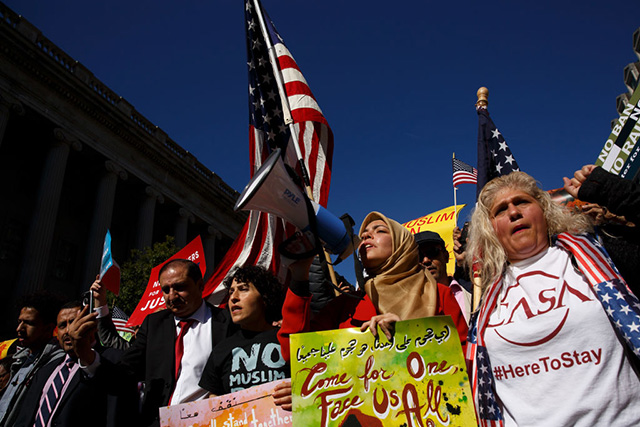
Honest, paywall-free news is rare. Please support our boldly independent journalism with a donation of any size.
As the Supreme Court ruled on Monday that the Trump administration can enforce the latest version of its travel ban while lower courts hear legal challenges, civil rights groups were busy filing a brief in a federal appeals court providing new evidence for their case against the ban. The brief points out that President Trump posted anti-Muslim propaganda videos promoted by a British right-wing hate group on Twitter last week.
The Supreme Court’s decision to honor the Trump administration’s request and stay lower court rulings that have blocked full enforcement of what civil rights groups call the “Muslim Ban 3.0” was a win for Trump, who has spent most of his first term seeking severe restrictions on travelers from several Muslim-majority countries. However, victory may be short-lived if plaintiffs challenging the ban can convince federal judges that Trump is acting out of animus toward Muslims rather than the pure desire to protect the United States from terrorists.
Gadeir Abbas, a senior attorney with the Council on American-Islamic Relations, told Truthout that the legal challenges to the latest travel ban, as well as other civil rights lawsuits alleging Trump has unfairly stigmatized Muslims, will show that the ban “is intended to and does in fact broadcast a message that Muslims are dangerous and worthy and special treatment.”
“There’s a lot of litigation that is bubbling below the surface,” Abbas said.
Trump supplies the evidence himself. Last week, Trump faced condemnation from leaders in the United Kingdom and across the globe for retweeting propaganda videos purporting to show Muslims committing violence against Christians. The videos came from Britain First, an ultra-nationalist hate group in the UK that promotes the message that we are in the midst of a civilizational war between Islam and Christianity. Analysts and media outlets quickly determined that the images in the videos were taken out of context or presented alongside false information to further the group’s extremist agenda.
Trump did not back down in the face of international criticism. In fact, he responded to a rebuke from British Prime Minister Theresa May with a tweet demanding that she instead focus on the “Radical Islamic Terrorism” in her own country. That tweet was reminiscent of a now infamous 2015 tweet in which Trump accused the UK of having a “massive Muslim problem.”
White House Press Secretary Sarah Sanders defended Trump, saying the “threat is real” whether the videos are or not. Sanders also asserted that Trump was using the videos to raise issues around “security and public safety for the American people.” Sanders also said Trump has been talking about these security issues since he was on the campaign trail, and he “addressed these issues with the travel order that he issued earlier this year and the companion proclamation.”
In a brief filed with the Fourth Circuit Court of Appeals on Monday, a coalition of civil rights groups and advocates for immigrants and Muslims pointed to the Britain First video retweets — as well as the press secretary’s defense of Trump’s decision to post them — as clear evidence that animosity toward Muslims is still motivating the Trump administration.
“While Plaintiffs’ arguments before this Court remain the same, this new evidence provides further support for those arguments because the President’s statements express hostility towards Muslims and foment conflict between Christians and Muslims in the United States, and his spokesperson’s remarks directly link the anti-Muslim statements to the [travel ban] itself,” the groups wrote.
Trump’s comments on the campaign trial — he proposed banning all Muslims from entering the US and contemplated creating a database of Muslim immigrants — came back to haunt his legal team as they fought off challenges to the earlier versions of the travel ban. Civil rights attorneys argued that his statements showed the intent to illegally discriminate against Muslims based on their religion, and federal judges considered the statements in rulings blocking all or parts of the previous travel bans.
Unlike previous versions, the latest travel ban includes travelers from North Korea and certain government officials from Venezuela, two countries that are not majority-Muslim. The Trump administration says those countries, along with Chad, Somalia, Iran, Yemen and Syria, were chosen because a “worldwide review” determined that the governments of these nations do not use adequate screening measures and security protocols to prevent potentially dangerous individuals from finding their way to the US.
Critics argue that the Trump administration added Venezuela and North Korea to defend itself against allegations that it is illegally discriminating against immigrants based on their national origin and unconstitutionally targeting Muslims based on their religion.
The Fourth and Ninth Circuit appeals courts will hear oral arguments in the two main challenges to the travel ban before the end of the week. Still, it will likely be the Supreme Court that decides the ban’s ultimate fate. Expect Trump’s Twitter account to take center stage in the courtroom.
Press freedom is under attack
As Trump cracks down on political speech, independent media is increasingly necessary.
Truthout produces reporting you won’t see in the mainstream: journalism from the frontlines of global conflict, interviews with grassroots movement leaders, high-quality legal analysis and more.
Our work is possible thanks to reader support. Help Truthout catalyze change and social justice — make a tax-deductible monthly or one-time donation today.